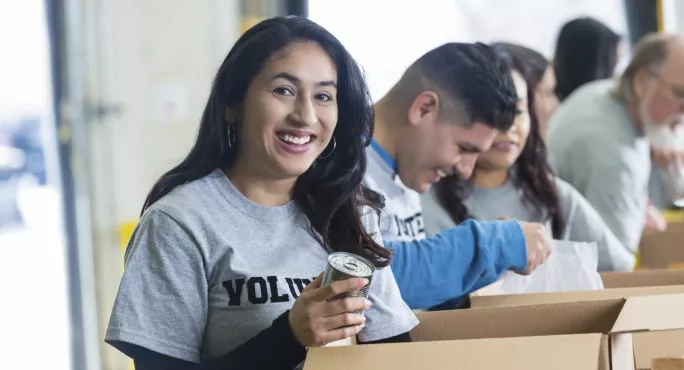- Home
- Seven ways that volunteering helps the teenage volunteers themselves
Seven ways that volunteering helps the teenage volunteers themselves

Every school student should do some volunteering at some point in their school career. It is good for them, good for the people they help and good for society.
National figures published in 2015 show that 42 per cent of us have volunteered once in the previous year, and 27 per cent once a month over that period. That amounts to nearly 22 million people throughout Britain, improving our communities, supporting others and making an important contribution to society.
For many people, volunteering is a response to the world around them, often to a particular need in their local community. But there is a wealth of evidence showing the positive impact that volunteering has on the individual volunteer.
For more than 200,000 young people during the last few years, the volunteering experience has come through the National Citizens’ Service (NCS), a scheme for 15- to 17-year-olds that takes place over four weeks out of term time. A huge range of opportunities for social action is offered to young people, who also get the chance to learn something about themselves in a new situation. Schools should encourage all their students in this age group to sign up for NCS and spend some productive time helping others in the holidays.
As a 17-year-old I spent some weeks volunteering, rebuilding a school run by a charity. I used skills I didn’t know I had and learnt a lot about myself.
I have recently become chair of a charity, which has just changed its name from WorldWide Volunteering to Step Forward Volunteering, a move that more accurately describes our work, providing tailored one-to-one support to help individuals into volunteering placements, helping them develop the personal and practical skills required to build a more positive future.
The focus of Step Forward is on helping those most in need of support, including young people leaving care; those recovering from drug and alcohol misuse; young carers; those at risk of homelessness and/or offending; or young people who have experienced domestic violence and abuse. We also support adults who face significant challenges as a result of critical injury and trauma; leaving the criminal justice system; drug and alcohol misuse; long-term unemployment; mental ill-health; homelessness; isolation and disengagement with society.
Step Forward doesn’t just match volunteer to placement. Disadvantaged people very often lack the self-confidence to work or the self-esteem to engage with people they haven’t met before. So a process of one-to-one coaching takes place to help individuals develop the self-belief in their ability to affect change; and the personal skills and attitudes to take control and move forward with their lives. Carefully chosen volunteering placements are chosen to match the individual’s needs, interests and ambitions.
In this way, volunteering for these disadvantaged people can be the first step forward on the path to a more productive life, helping them to feel valued as contributing members of society and to build new social networks.
Voluntary work can transform the lives of both the volunteers and the supported. Whether the volunteers are the disadvantaged people of all ages that are helped by Step Forward or young people on an NCS programme, there are many gains.
It is easy to see why volunteering helps those who are being supported or assisted. But it is worth thinking too about the ways in which volunteering helps the volunteers through:
- Gaining employability skills There is the opportunity to learn new occupational skills and get new experiences, which will help future employability prospects. Volunteering also helps the development of critical workplace skills, including communication, leadership, delegation and problem solving. According to a recent survey, 73 per cent of UK employers regard volunteering favourably on an applicant’s CV.
- Improving overall health Volunteering England’s 2008 study concluded that there was a clear link between volunteering and good health for volunteers. Engaging in volunteering can increase longevity, improve mental health and keep people fitter.
- Reducing stress 78 per cent of people surveyed in the US who had volunteered in the previous 12 months said that volunteering had lowered their stress levels.
- Supporting personal development Volunteering can help to build self-esteem and confidence. Young people who participate in volunteer activities tend to engage less in risk-taking behaviours such as smoking, drinking alcohol and using illicit drugs.
- Increasing happiness Researchers at the London School of Economics examined the relationship between volunteering and measures of happiness in a large group of adults. They found the more people volunteered, the happier they were.
- Making friends and expanding networks Volunteering can provide an opportunity to make friends with people from different backgrounds and cultures and help to build understanding.
- Strengthening communities By bringing people together from different parts of the community, volunteering has been shown to bring about a greater awareness in people of the issues faced by their community. It increases community cohesion.
Volunteering should not be confused with work experience. Helping younger pupils at a school is volunteering, but working for a business is work experience.
Work experience has its place, but teachers should encourage almost all young people to volunteer. It offers so much more than a bonus on their cv.
John Dunford is chair of Whole Education, as well as a former secondary head, general secretary of the Association of School and College Leaders and national pupil premium champion
@johndunford
Want to keep up with the latest education news and opinion? Follow TES on Twitter and like TES on Facebook
Keep reading for just £1 per month
You've reached your limit of free articles this month. Subscribe for £1 per month for three months and get:
- Unlimited access to all Tes magazine content
- Exclusive subscriber-only stories
- Award-winning email newsletters



